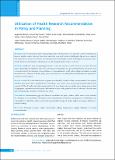Please use this identifier to cite or link to this item:
https://hdl.handle.net/20.500.14356/1693| Title: | Utilization of Health Research Recommendation in Policy and Planning |
| Authors: | Dhimal, Meghnath Pandey, Achyut Raj Aryal, Krishna Kumar Buddhathoki, Chitra Bahadur Vaidya, Daya Laxmi Karki, Khem Bahadur Onta, Sharad |
| Citation: | DhimalM., PandeyA. R., AryalK. K., BuddhathokiC. B., VaidyaD. L., KarkiK. B., & OntaS. (2017). Utilization of Health Research Recommendation in Policy and Planning. Journal of Nepal Health Research Council, 14(3). https://doi.org/10.33314/jnhrc.v14i3.872 |
| Issue Date: | 2016 |
| Publisher: | Nepal Health Research Council |
| Article Type: | Original Article |
| Keywords: | Actionable message Evidence based policy making Nepal Policy making Utilization of research recommendation |
| Series/Report no.: | Sep-Dec, 2016;872 |
| Abstract: | Abstract Background: Over the past decade in Nepal, a large number of studies have been carried in a variety of health areas; however whether evidence derived from these studies has been used to inform health policy has not been explored. This study aims to assess the utilization of recommendations from health research in health policy and plans, and to identify the factors that influence utilization of research findings by policy makers’ in Nepal. Methods: Qualitative study incorporating literature review and semi-structured interviews was used. Research reports and health related policies were collected from governmental and non-governmental bodies. Documents were reviewed to identify the utilization of research-based recommendations in health policy and plan formulation. In-depth interviews were conducted with key policy makers and researchers to identify factors that hinder the utilization of research recommendations. Results: A total of 83 health related research reports were identified, of which 48 had recommendations. Four policies and three plans, from total 21 identified plans and policies, were found to have incorporated recommendations from research. Of the 48 studies that had recommendations, 35 were found to be used in the policy making process. Lack of appropriate communication mechanisms, and concerns related to the quality of research conducted, were the main factors hindering the translation of evidence into policy. Conclusions: Communication gaps exist between researchers and policy makers, which seem to have impeded the utilization of research-based information and recommendations in decision-making process. Establishing a unit responsible for synthesizing evidences and producing actionable messages for policy makers can improve utilization of research findings. Keywords: Actionable message; evidence based policy making; Nepal; policy making, utilization of research recommendation. |
| Description: | Original Article |
| URI: | http://103.69.126.140:8080/handle/20.500.14356/1693 |
| ISSN: | Print ISSN: 1727-5482; Online ISSN: 1999-6217 |
| Appears in Collections: | Vol. 14 No. 3 Issue 34 Sep-Dec 2016 |
Files in This Item:
| File | Description | Size | Format | |
|---|---|---|---|---|
| 872-Article Text-1661-2-10-20170528.pdf | Fulltext Download | 162.3 kB | Adobe PDF |  View/Open |
Items in DSpace are protected by copyright, with all rights reserved, unless otherwise indicated.
